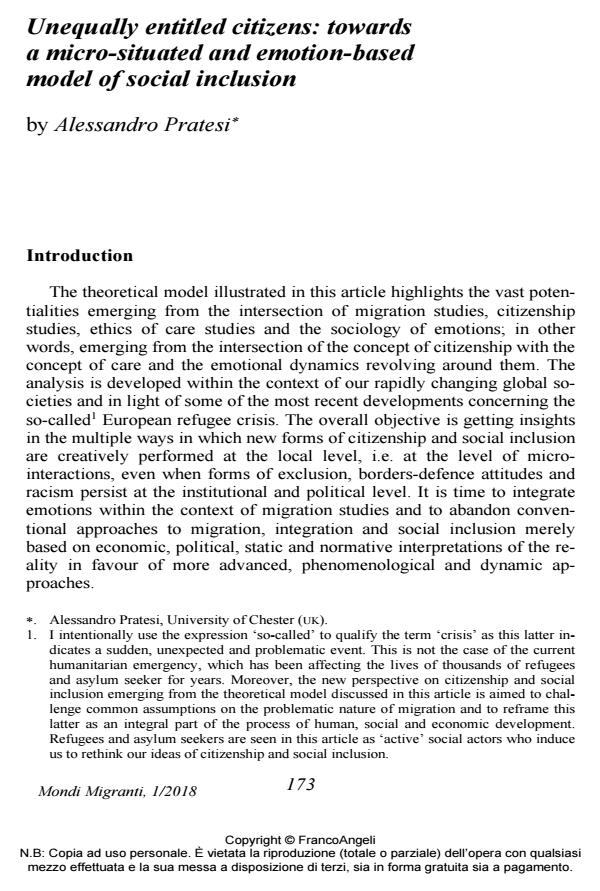Unequally entitled citizens: towards a micro-situated and emotion-based model of social inclusion
Titolo Rivista MONDI MIGRANTI
Autori/Curatori Alessandro Pratesi
Anno di pubblicazione 2018 Fascicolo 2018/1
Lingua Inglese Numero pagine 26 P. 173-198 Dimensione file 241 KB
DOI 10.3280/MM2018-001009
Il DOI è il codice a barre della proprietà intellettuale: per saperne di più
clicca qui
Qui sotto puoi vedere in anteprima la prima pagina di questo articolo.
Se questo articolo ti interessa, lo puoi acquistare (e scaricare in formato pdf) seguendo le facili indicazioni per acquistare il download credit. Acquista Download Credits per scaricare questo Articolo in formato PDF

FrancoAngeli è membro della Publishers International Linking Association, Inc (PILA)associazione indipendente e non profit per facilitare (attraverso i servizi tecnologici implementati da CrossRef.org) l’accesso degli studiosi ai contenuti digitali nelle pubblicazioni professionali e scientifiche
This article illustrates a micro-situated and emotion-based model of social inclusion aimed to overcome current limitations of the concept of citizenship. A growing number of critical theorisations of care work, intimacy and citizenship from feminist, multicultural and global perspectives support the argument that nonconventional forms of intimacy and care represent an opportunity to explore possible sites of resistance against macro-structural forces while at the same time avoiding marginalisation. The theoretical contribution illustrated in this article discusses the extent to which a micro-situated and emotion-based model of social inclusion can be applied to several types of unequally entitled citizens in different cultural contexts. Its overall objective is developing new perspectives to under-stand the relationship between individuals, local communities and political institu-tions and to grasp useful insights into how people across the globe resourcefully "do citizenship" and social inclusion through care practices and the emotional dynamics revolving around them. In other words, to explore and understand how new, creative ways to define citizenship and social inclusion can be activated at the local level of micro-interactions even when forms of institutional exclusion and racism persist at a structural and political level. The new perspective on citizenship and social inclusion emerging from the proposed theoretical model challenges common assumptions on the problematic na-ture of migration and reframes this latter as an integral part of the process of hu-man, social and economic development.
Il presente articolo illustra un modello di inclusione sociale micro-situato e basato sulle dinamiche emozionali che ha l’intento di superare le limitazioni correnti del concetto di cittadinanza. Un numero crecente di teorizzazioni critiche sul lavoro di cura, su nuove modalità di far famiglia, e sul concetto di cittadinanza da prospettive femministe, multiculturali e globali evidenzia il legame significativo tra forme di cura e di famiglia non convenzionali e la possibilità di realizzare forme di inclusione sociale che siano in grado allo stesso tempo di resistere contro forme di resistenza strutturali e di evitare la marginalizzazione. Il contributo teorico illustrato nel presente articolo discute la possibilità di applicare tale modello di inclusione sociale a vari tipi di "cittadini non riconosciuti" e in vari ambiti culturali. L’obiettivo generale è quello di sviluppare nuove prospettive che ci aiutino a comprendere la relazione tra individui, comunità locali e istituzioni politiche e a far chiarezza sul modo in cui vari tipi di attori sociali nel modo "fanno cittadinanza" e inclusione sociale attraverso le pratiche di cura e le dinamiche emozionali che attorno ad esse si sviluppano. In altre parole, quello di esplorare e di capire in che modo nuovi e creativi modi di definire i concetti di cittadinanza e di inclusione sociale possono essere attivati a livello locale delle interazioni faccia-a-faccia an-che quando forme di esclusione e di razzismo persistono a livello istituzionale e politico. La nuova prospettiva sui concetti di cittadinanza e di inclusione sociale che emerge dal presente contributo teorico ridiscute luoghi comuni sulla natura problematica dei flussi migratori ridefinendo questi ultimi come parte integrante del processo di sviluppo umano, sociale ed economico.
Parole chiave:Cittadini non riconosciuti; Dinamiche emozionali; Cura; Cittadi-nanza; Forme di inclusione sociale anti-assimilazioniste.
Alessandro Pratesi, Unequally entitled citizens: towards a micro-situated and emotion-based model of social inclusion in "MONDI MIGRANTI" 1/2018, pp 173-198, DOI: 10.3280/MM2018-001009